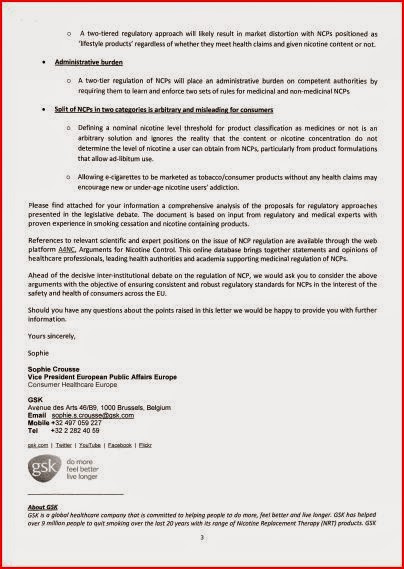I was recently sent an article from an American friend from Los Angeles who, like me, thought the recent ban of e-cigarettes from public places was, and I quote, "Bullshit".
I, myself, said goodbye to the weed back in November. I opted for the 10 Motives brand of e-cigarettes. They are cheap, give you the same 'hit' that a cigarette would and can be smoked [inhaled/exhaled] without annoying those non-smokers.
Last Saturday residents of Los Angeles were told that e-cigarette use at bars, restaurants and other public areas was now prohibited.
City Councilman, Joe Buscaino, expressed sympathy for e-cigarette users who oppose the ban, saying he and his colleagues were not presented with “conclusive evidence that second-hand vapor from e-cigarettes is harmful.” He said he tried to convince his peers to continue allowing e-cigarette use in bars, but that failed on an 8-6 vote.
So, 14 people voted on inconclusive evidence.
The pharmaceutical industry couldn't be behind this recent ban, could they?
Let's go back to 2013
Step forward one GlaxoSmithKline and a series of internal emails between Sophie Crousse, the Brussels-based vice president of European public affairs for GlaxoSmithKline's consumer health-care division and Dominik Schnichels, of SANCO (the European Commission’s Directorate General for Health & Consumers)
The content of the emails doesn't really surprise me, they basically show GlaxoSmithKline urging SANCO to regulate e-cigarettes as medicinal products.
What's striking for me is the footnote of an attached letter from Crousse to Schnichels. [Fig 1 & 2] It reads:
"GSK is a global health care company that is committed to helping people to do more, feel better and live longer.
"GSK has helped over 9 million people to quit smoking over the last 20 years with its range of Nicotine Replacement Therapy (NRT) products.
"GSK believes that this is testament to the role of appropriately regulated and efficacious products in gaining consumers' confidence in Nicotine Containing Products (NCPs).
"GSK also produces a range of medicines to support people with respiratory conditions through its pharmaceutical business."
Fig 1 & 2
The complete series of emails can be downloaded here.
GSK claimed they have helped over 9 million people quit smoking, they don't provide the names of the products that has apparently helped over 9 million people though.
We do know, however, that Glaxo manufacture and market Nicorette®, NicoDerm® CQ® and Commit® - they also manufacture and market a miraculous magic pill that can, apparently, help people quit smoking.
Zyban.
Unsuspecting members of the public will not know that Zyban is actually an antidepressant used to treat major depressive disorder and seasonal affective disorder. Glaxo basically re-badged their top selling antidepressant, Wellbutrin. But there was a sticky issue - how could they convince the public that an antidepressant could actually aid them in quitting smoking?
Simple really. Re-badge it and advertise it in such a way to con the public that it was a remarkable breakthrough in pharmacology.
Who do you think was behind this mass campaign?
Look no further than the current CEO of GlaxoSmithKline, Andrew Witty (Sir Andrew Witty if you feel inclined to use his correct title)
1997/98 is a period of time where Witty was heavily involved in marketing although there are very few articles left on the internet that show this.
Glaxo Wellcome'sVP-General Manager of Marketing Andrew Witty, as he was known between 1997/98, worked very closely with prescription drug ads on TV. This is known as DTC or Direct to Consumer advertising.
In August 1997 the US Food and Drug Administration [FDA] relaxed its rules on DTC, it basically meant that the FDA were giving carte blanche to the pharmaceutical industry whereby they could promote their products in TV ads without giving detailed medical information on the indications, potential side effects, or proper use. [1]
Witty was quick to pounce. Why wouldn't he? DTC is lucrative for the pharmaceutical industry, well, it is in America and New Zealand as these are the only two countries that allow TV ads for prescription medication.
Witty added more products in 1997 with Glaxo's new anti-smoking pill Zyban, [buproprion] which got an estimated $55 million in support (the brand is even got TV teaser ads prior to its launch)
Here's a Zyban ad from 1997, this is one that Witty would have been behind as Glaxo Wellcome'sVP-General Manager of Marketing. What I find remarkable about this ad is that they do not distinguish the two brand names as being practically the same. The only warning they offer is, "Don't take Zyban if you are taking Wellbutrin" - Surely it would have been morally ethical to tell the consumer, "If you take Zyban and Wellbutrin together you will actually be overdosing on the active ingredient, bupropion." But hey, why would a pharmaceutical company, like Glaxo, wish to inform its consumers that a drug that could help you quit smoking was really an antidepressant?
The rub here is pretty simple.
Users of Wellbutrin have found that it is extremely hard to quit. Imagine then if you double the dose of something that is difficult to quit.
It's a win/win situation for the person/s selling you the drug.
Hey, you want a free sample of heroin?
No, no, it's not addictive.
What Glaxo did back then was sell an antidepressant to the public in the guise of an aid to help people quit one harmful substance. Ironically, the more they took, the harder it would be for them to quit the very same drug that was, apparently, designed to help them.
And now we have Glaxo telling SANCO that e-cigarettes need to be regulated.
Call me a cynic here if you wish but isn't the only reason behind GlaxoSmithKline's contact with SANCO one that is merely to keep their smoking cessation drugs on top of the sellers ladder?
Bob Fiddaman
[1] Do Ads Really Drive Pharmaceutical Sales? By Steven Findlay








No comments: